Katherine Anson: December 2011 Archives
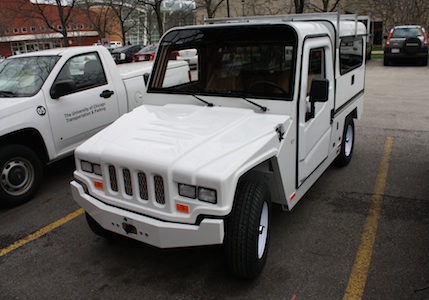
A new shipment recently arrived for Facilities Services: three 100% electric vehicles to be added to their current fleet. These are the first Neighborhood Electric Vehicles (NEVs) to come to UChicago’s campus. The cars, pictured above, will be replacing two 100% gasoline-powered trucks and a van.
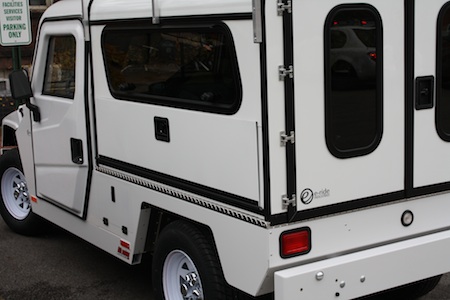
The NEVs are made in Minnesota by a company called e-ride. Using American Made parts and labor, they sell two models of vehicles the can be found on many other campuses, as well as in other settings. University of Wisconsin maintains about 40 of these cars in their fleet and just last April, e-ride vehicles made their debut in Antarctica. On our campus, the vehicles will most likely serve one of Facilities’ shops, such as the carpentry or painting shops. In the coming weeks, these shops will be piloting the NEVs, which will inform Facilities’ needs for the next shipment of electric vehicles. One limitation, about which we’re already aware, is that each car can only carry up to 4,200 pounds. Thus, they will be used primarily to transport people and smaller equipment in the shops.
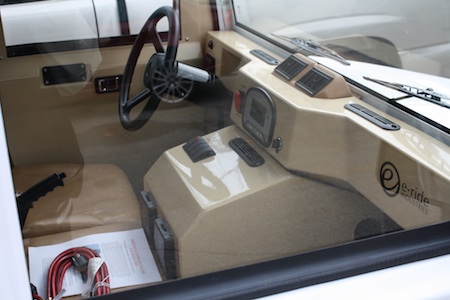
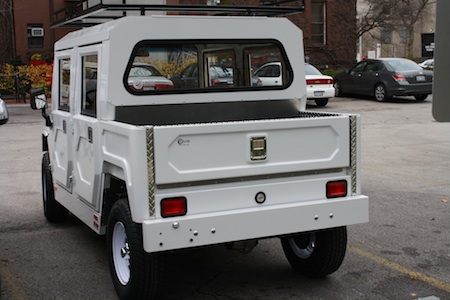
As they run on only electric charge, the NEVs are rather simple in design. The windows must be hand churned, there is no radio, and the only fluid under the hood is a small container of brake fluid. They charge for approximately eight hours (overnight) and should last about 20-35 miles per charge, depending on conditions and what utilities are used. When accelerating, the NEVs have a good amount of pick up but top off at around 25 mph—perfect for on-campus driving.
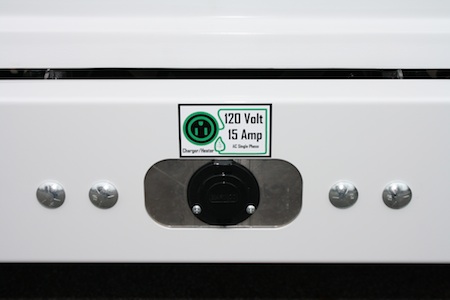
The addition of NEVs to the campus fleet is one of many steps the University is taking to make the campus more sustainable. According to Kevin Austin, the Director of Building Services for Facilities Services, “end users have to invest in and commit to a technology in order for it to survive and evolve over time.” As the University makes this initial commitment to electric transportation, Facilities hopes to continue to invest in similar green technologies.
Published since 1989, National Wildlife Federation’s (NWF) Campus Ecology sustainability case study database has become a valuable resource for students, faculty, administrators, community leaders and others interested in the role of colleges and universities in protecting the public health and welfare by reducing waste, pollution, and congestion in their communities.
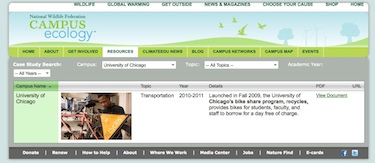
The University of Chicago submitted a case study featuring recycles, the free campus bike share program launched in 2009. In addition to community building through the program’s partnership with Blackstone Bicycle Works, recycles encourages the University community to try two-wheeled transportation, whether that’s attending a meeting or class across campus, running errands in the neighborhood, or going for a leisurely spin. The bike share program has been resoundingly successful and over the course of the past several years, UChicago has experienced an increased interest in cycling and commitment to cycling infrastructure, leading to an Honorable Mention designation as a Bicycle Friendly University from the League of American Bicyclists.
The only catalog of its kind, National Wildlife Federation’s campus sustainability case study database is available online. In addition to the 2011 submissions, the database includes more than 600 case studies from campuses across the U.S. spanning more than a decade.
